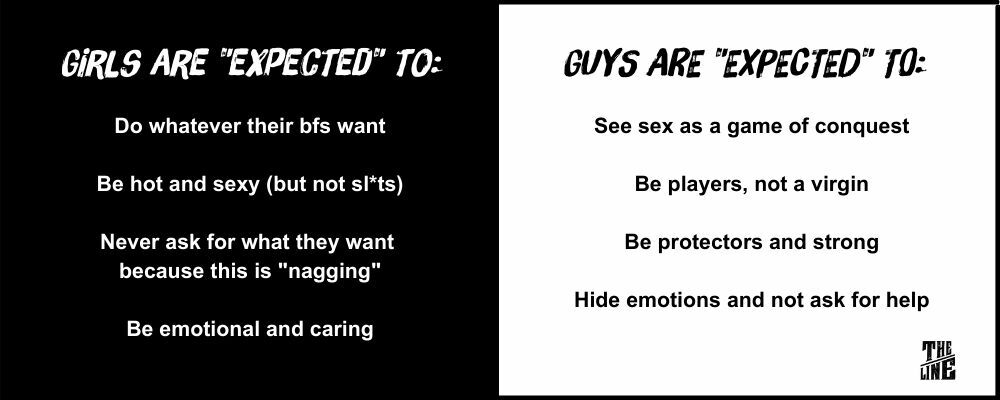Adolescence is a time where young people are forming their attitudes, behaviours and expectations on lots of topics, such as sex, dating, relationships, the world in general – and gender.
While exploring and testing their ideas, many young people will already have begun to accept some gender stereotypes as universal truths.
Because of this, it’s important that we have conversations with young people as early as possible so that they can challenge these stereotypes.
This is so that young people can live their lives free from limiting ideas about how they "should" be.
We also need to work with young people to challenge rigid gender stereotypes which are a key driver of violence against women.
What is “gender”, anyway?
The concept of “gender” is a complicated one. The word is sometimes used to describe an identity category such as “man” or “woman”, "boy" or "girl". Other times, it’s used to describe the things society tells us about how men and women “should” behave (e.g how they dress, cut their hair, speak or act).
When you fill out a questionnaire, you are often asked for your sex or gender. Some people think sex and gender are the same thing, or mix these ideas up, but they're actually different.
Sex is biological
You are assigned a sex at birth based on a set of characteristics associated with reproduction and biology. Individuals are generally assigned into categories of “male” or “female”. Some people are born with a unique combination of chromosomes or genitals that do not align with these prescribed categories – these people are referred to as people with intersex variation.
Gender is socially constructed
It’s shaped by the society and culture we live in. Gender refers to the set of ideas society has about the roles, behaviours, activities and attributes that men and women “should” have, e.g how they dress or cut their hair, how they speak, how they act.
Gender expectations vary between cultures and can change over time. Sometimes we attempt to lock people into simple and rigid gender roles, when actually there’s no one way of being or doing “your gender”.
Gender stereotypes
Gender stereotypes are oversimplified ideas, messages and images about differences between males and females. They impact how young people go about their lives.

Gender stereotypes can restrict individuals into narrowly defined roles, interests, attributes, characteristics and behaviours.
Young people may make decisions about their lives and relationships according to what attitudes and behaviours they see encouraged and discouraged. For example, they can feel pushed into education and career pathways because ‘that’s what guys/girls do’.
When we say…
"Girls only like..."
"Guys always go for..."
"Girls are better at..."
"Guys naturally know how to..."
…we are talking about gender, and we present these stereotypes as ‘fact’ – rather than considering evidence, or an individual’s talents or interests.
Relying on stereotypes means that young men and women get treated differently, learn different things and have unequal access to opportunities, instead of being encouraged to develop their own understandings of what their abilities and boundaries are.
Why do gender stereotypes matter?
Gender stereotypes and roles encourage and reinforce inequality between men, women and others, including gender diverse and transgender people.
Upholding gender stereotypes and roles mean that:
- People are encouraged to adopt distinct and opposing gender identities – to either be a ‘man’ who is expected to be rational, strong and powerful, or a ‘woman’ who is supposed to be caring, emotional and cooperative.
- People who do not conform to these dominant ideas about gender face judgement, exclusion, verbal and physical abuse or discrimination. This can happen to people of any gender at any age.
- Women and girls are more likely to experience disrespect and violence due to rigid gender stereotypes. This is because these stereotypes promote problematic differences between men and women, including that men are more “naturally aggressive” and women as are “submissive, and that men have more power over women.
- The status quo is reinforced – a society that has historically seen men as superior to women remains unchallenged. Men’s disproportionate access to power and authority in public and private life is seen as ‘natural’ because of outdated ideas such as “men make better leaders”.
Read next: Challenging gender stereotypes



